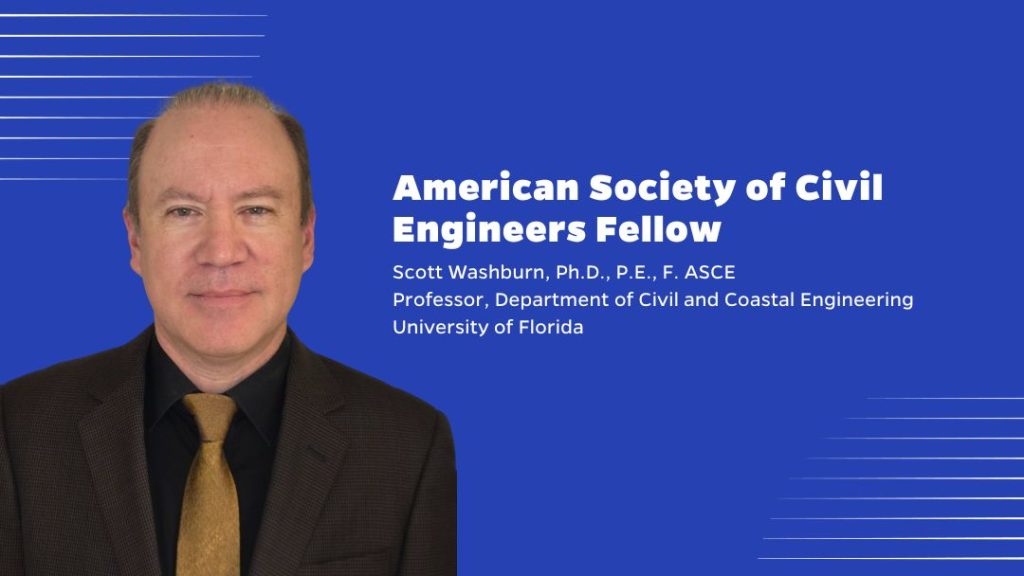By Ines Aviles-Spadoni, M.S., M.A., UFTI Research & Communications Coordinator
Scott Washburn, Ph.D., P.E., a respected faculty member at UF’s Department of Civil and Coastal Engineering, has been elected as a Fellow of the American Society of Civil Engineers (ASCE). This prestigious recognition honors Washburn for decades of leadership and outstanding contributions to the field of civil engineering.
“It is a great honor to be recognized with the Fellow status by ASCE–an organization that has had an incredible impact on society and the profession of civil engineering over its long and rich history,” he said.
Washburn has been a well-known figure for 30 years in the civil engineering world in both academic and private practice circles. He has made a significant impact in the transportation profession, primarily in the areas of traffic operations analysis and simulation modeling. Washburn has also been a prominent educator, influencing over 1,500 students across 10 different courses. He has mentored more than 70 master’s and doctoral students in his career and more than 30 undergraduate research assistants.
Wei Sun, Ph.D., co-founder and CEO of AIWaysion, a connected vehicle technology firm that uses artificial intelligence and edge computing technologies to create safer and more efficient transportation, reflects on his experience as a graduate student working under Washburn’s guidance. He considers himself very fortunate to have worked with him at such an important stage in his career.
“I was Professor Washburn’s Ph.D. student and worked as a research assistant with him on various projects—an experience that was truly formative in both my academic and professional journey,” Sun said. “His deep expertise in traffic operations, modeling and simulation, and software development played a pivotal role in shaping how I approach real-world transportation challenges. I benefited greatly from his commitment to practical, data-driven solutions and his genuine dedication to mentoring students.”
Washburn is also co-author of a textbook on highway engineering and traffic analysis, which is popular and used by both students and professionals. The book is titled “Principles of Highway Engineering and Traffic Analysis, 7th Edition” published by Wiley.
“The textbook is the #1 selling book in its market—more than 45,000 copies have been sold since 2004 and it has been adopted by instructors at over 140 different colleges/universities worldwide,” he said. “It has been extremely gratifying to see the level of impact this book has had on transportation engineering education.”
As a researcher, Washburn has been a trailblazer in traffic analysis and has made some very important contributions that have been included in the Highway Capacity Manual (HCM). His work in two-lane highway simulation modeling has also positioned him as an authority in this area of transportation engineering.
“Two-lane highways account for a large percentage of highway mileage in the United States and serve an important function for the movement of people and goods within the national highway system,” Washburn said. “Two-lane highways present some different challenges for traffic analysis relative to other roadway facility types due to their greater variability in roadway geometry and the unique phenomenon of passing in the oncoming lane of traffic. It has been very professionally rewarding to make significant contributions to advancing the state-of-the-art in two-lane highway simulation modeling and practice-level analysis methods that are now incorporated in the HCM.”
Washburn has dedicated 24 years of his career to the HCM through his tireless work as an active member of the Transportation Research Board’s (TRB) Highway Capacity and Quality of Service Committee (HCQSC). Equally extensive has been his affiliation with ASCE through serving as a faculty advisor to the University of Florida’s Concrete Canoe team, participating in legislative “Fly-ins” to Congress, and through his various presentations at ASCE conferences and publications in ASCE journals.
To be selected as an ASCE Fellow, candidates must have served a minimum of 10 years as a member of the organization and hold a Professional Engineer (P.E.) license. ASCE Fellows represent the top 3% of the organization’s membership.
Congratulations to Scott Washburn for his ASCE Fellow status, a well-deserved accolade that is validation for his lifelong commitment to the field of civil engineering.

